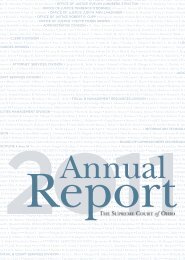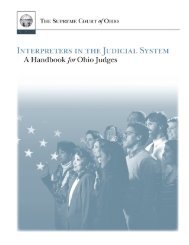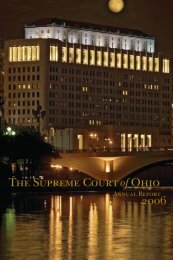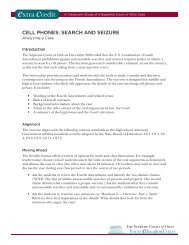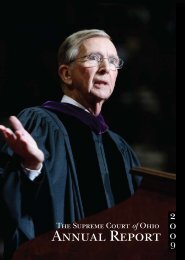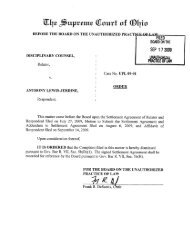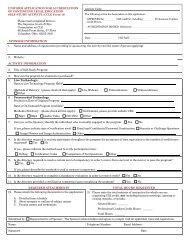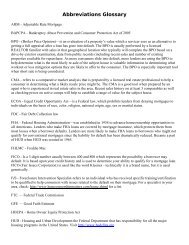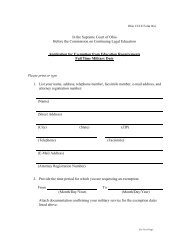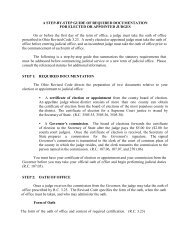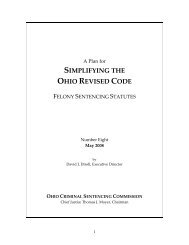Planning for Parenting Time: Ohio's Guide for Parents Living Apart
Planning for Parenting Time: Ohio's Guide for Parents Living Apart
Planning for Parenting Time: Ohio's Guide for Parents Living Apart
You also want an ePaper? Increase the reach of your titles
YUMPU automatically turns print PDFs into web optimized ePapers that Google loves.
Words You May Need to Know<br />
<strong>Parenting</strong> Order – A court order that states<br />
when the child will be with each parent<br />
and who will make decisions. The<br />
parenting order may be developed by<br />
the parents on their own or with the help<br />
of a professional, such as a mediator, an<br />
attorney or a judge.<br />
<strong>Parenting</strong> <strong>Time</strong> – The time a child spends<br />
with a parent according to the parenting<br />
time schedule.<br />
Paternity – A legal action that results in a<br />
court order naming the child’s father.<br />
Protection Order – An order issued by the<br />
court to protect the person receiving the<br />
order and named children or other<br />
household members from physical<br />
violence.<br />
Residential Parent – The parent with whom<br />
the child physically lives according to a<br />
court order. In a shared parenting plan<br />
“residential parent <strong>for</strong> school purposes”<br />
or “school placement parent” is the<br />
parent in whose school district the child<br />
can attend school.<br />
Shared <strong>Parenting</strong> Plan – The document that<br />
states how the parents will make<br />
decisions <strong>for</strong> their children and the<br />
parenting time schedule.<br />
Sole Residential Parent – The parent who<br />
has the right, by way of a court order or<br />
law, to make major decisions <strong>for</strong> the<br />
children and with whom the children<br />
live when there is not shared parenting.<br />
Major decisions may include those<br />
concerning medical care, religion,<br />
extracurricular activities or education.<br />
Statute – A law of the state of Ohio passed<br />
by the legislature. Most statutes relating<br />
to family law are in Title 31 of the Ohio<br />
Revised Code. They are available in<br />
libraries or online.<br />
Stipulation – A <strong>for</strong>mal agreement of the<br />
parties. When written and signed by<br />
both parties, it may become a court<br />
order if approved by a judge.<br />
Supervised Exchanges – Pick up and drop<br />
off of the child in the presence of<br />
another specified adult.<br />
Rules of Court – A set of rules that control<br />
court procedures. The Ohio Rules of<br />
Civil Procedure apply to divorces and<br />
dissolutions. Individual courts may have<br />
local rules of practice.<br />
Shared <strong>Parenting</strong> – Both parents share<br />
making major decisions <strong>for</strong> their<br />
children, unless stated otherwise in the<br />
Shared <strong>Parenting</strong> Plan. It does not<br />
necessarily mean equal time with each<br />
parent.<br />
76<br />
Supervised <strong>Parenting</strong> <strong>Time</strong> – <strong>Parenting</strong><br />
time during which the parent and child<br />
must be in the presence of another<br />
specified adult.<br />
Therapeutic Supervision – Supervision of<br />
parent-child contacts provided by a<br />
therapist.<br />
Transition – The adjustment time <strong>for</strong><br />
parents and the child immediately<br />
be<strong>for</strong>e, during and after the exchange of<br />
the child between the parents or other<br />
caregivers.



